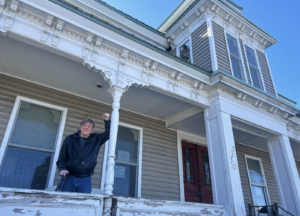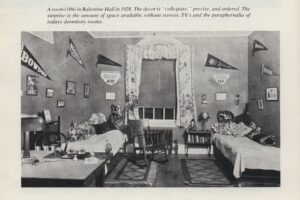Last week, Mwika musicians from Tanzania came to Orono for a performance at the Church of the Universal Fellowship.
The group of 13 musicians and their college principal are representing their tribes, country and college, Stefano Moshi Memorial University College, Mwika, from which they graduated from in 2013.
Shirley Rush, associate professor of social work at the University of Maine Presque Isle, has taught in Tanzania as part of her sabbatical in fall 2013. While teaching a class in communications, the Mwika musicians sang for her.
“It felt like I was in the midst of angels,” Rush, who accompanied the Mwika musicians to the University of Maine, said. “I began to cry, which is against Tanzanian culture, so I explained to them that I was crying tears of joy. In that moment, said to them I don’t have money, you don’t have money, but you are coming to Maine.”
That day Rush started her 18-month-long journey of making this goal happen.
“There was no model for us to follow, it was an amazing but a very ambitious project. Some people told that the musicians would never get visas, and wouldn’t raise enough money, but we always believed and hoped for magic to happen, and here we are,” Rush said.
In order to get advice on how to apply for visas for Tanzanians, Rush contacted Sarah Joughin, assistant director of International Student and Scholar Services at the Office of International Programs (OIP) at UMaine.
“When Shirley filled me in on the projects, and showed the clip of Mwika musicians singing on her phone, I was very amazed and moved by them. I told Shirley if they are coming to Maine, they might as well stop by Orono,” Joughin said.
The musicians gave their first performance in Orono at the Church of Universal Fellowship on Saturday, Sept. 26.
“I guess I did not really know what to expect but they were beyond my highest expectations,” Joughin said. “The audience has done a marvelous job of welcoming the musicians.”
During their visit to Orono, community members, OIP staff and students in the African Student Association (AFSA) helped the musicians adjust to their stay. The group was also eager to get a tour of the UMaine campus.
“When I took them to the Fogler Library, they were all struck,” Joughin said. “One of them said that with all these resources, UMaine students must not fail their classes. This made me realize just how much we really have. The things and opportunities we take for granted here could mean everything to a musician from Tanzania.”
Yvane Ingabire, a senior management student at UMaine, moved to the U.S. due to the ongoing instability in her home country of Burundi, a neighboring country of Tanzania.
Ingabire was able to communicate with the Mwika musicians in Kiswahili (Swahili), which is a language spoken in eastern and central Africa.
“It felt so awesome speaking Kiswahili with them. I was waiting for so long to find people that I can have a long conversation with in Kiswahili,” Ingabire said. “Just seeing them and watching them sing was such a heartwarming moment for me. Their voices brought me back to Africa and made me realize how much I miss my country.”
“It was a treat to have the group visit UMaine and share their culture,” Hina Hashmi, a 2015 UMaine graduate, said.
Hashmi, who currently works for UMaine’s department of molecular and biomedical sciences as a laboratory manager, received the Honors College Rezendes Global Service Scholarship in 2014 and traveled to Tanzania that summer to volunteer.
For three weeks, Hashmi worked closely with medical staff on the public health team of the rural village of Pommern in central Tanzania, which has the highest prevalence of HIV and AIDS in the country.
“One of the highlights of my experience was the jubilance of the people,” Hashmi said. “Hearing the Tanzanians perform at our university made me feel nostalgic for those mornings we would wake up to the beautiful voices of villagers singing, the voices heard from the churches every day, and also from the schools.”
While preparing for their concert, Mwika musicians practiced with the UMaine Oratorio Society. At the end of their joint rehearsal, The Maine Steiners, UMaine’s all-male a cappella group, performed for the Mwika musicians.
“Steiners were really good. I liked their harmonies and the use their voices as instrument,” Joseph Mutegi Mugao, one of the Tanzanian musicians said.
The International Student Association (ISA) contributed toward funding tickets for the group to see the Bangor Symphony Orchestra (BSO) concert at the Collins Center for the Arts. On Sunday, Sept. 27, the group was able to experience a symphonic orchestra concert live for the first time.
“Back in Tanzania, they used to gather all together and watch [the] Chicago Symphony Orchestra on YouTube. We didn’t tell the musicians about BSO, so that was a special surprise for them,” Rush said.
“We sat at the balcony so we saw all the instruments,” Shimikyael Exaud Nyange, one of the Mwika musicians, said.
Nyange is a conductor of the brass choir at his church in Tanzania.
“While showing them around, we went to the Class of 1944 Hall. At the Minsky [Recital] Hall, Maine Masque was practicing and Mwika musicians sang some of their songs to them,” Joughin said.
The repertoire of the musicians consists of traditional African songs which come from different regions and tribes. The song lyrics reflect their Christian faith, while their rhythm and tunes incorporate their tribal spirit.
The Mwika musicians performed on campus at the Cyrus Pavilion Theater on Friday, Oct. 1, and also gave a short performance at the weekly ISA Coffee Hour at the Union on Friday. Their visit at UMaine was concluded by a potluck in the Estabrooke Hall ballroom.
“One of the students [at Coffee Hour] said to me, ‘this is why I love being at UMaine. Where else would you run into a group of Tanzanian singers?’” Joughin said.











